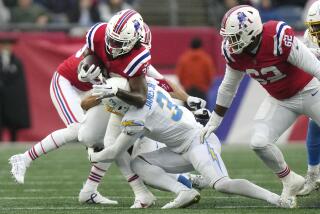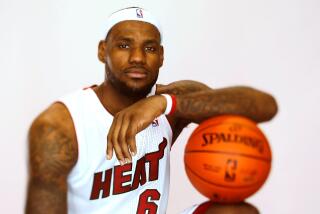PEOPLE : Patriots’ Woes Haven’t Sacked Kiam’s Spirit
- Share via
Victor Kiam once got so excited watching a football play that he knocked himself unconscious and speared his hand on a tennis trophy. He probably won’t be doing that again.
The New England Patriots’ owner and entrepreneur, known for trying to buy businesses he likes, says he’s still enthusiastic about his favorite spectator sport and the team he acquired two years ago.
But after last year’s dismal season, he’s containing his expectations.
“I’m not counting one single chicken until it’s in the broiler,” said Kiam, 63, whose hapless Patriots had five victories and 11 losses and missed the National Football League playoffs for the third straight time last year, his first full year as owner.
“I’m just as enthusiastic about winning, but I think I have tempered my anticipation,” Kiam said in an interview. “I’m saying, ‘OK, it looks good, let’s see what happens now.’ ”
Kiam is perhaps best known as that gravelly voiced guy in the bathrobe who has appeared on television pitching the shaver made by his Remington Products Inc. As he reminds TV viewers and others who meet him, he loved the shaver so much he bought the company.
Well, he likes football so much he bought the Patriots in 1988 from team founder Billy Sullivan, an accomplishment that Kiam at the time called “the ultimate football fanatic’s dream.”
His purchase was especially notable because other big-time takeover entrepreneurs such as Marvin Davis and Donald J. Trump had unsuccessfully attempted to buy the Patriots earlier.
Growing up, Kiam concentrated on tennis and eventually earned a national ranking. He was too skinny to play football but came to love its strategy and unpredictability. He admits that he knocked himself cold once in his living room when running along with a play on “Monday Night Football.”
Unfortunately for Kiam and Patriots fans, the team isn’t nearly as successful as its owner. New England finished fourth in its division and hurt for a quarterback. Important players suffered untimely injuries.
“Last year, we had three of our key players out for the last exhibition game. You go home exceedingly depressed--absolutely destroyed--and say, ‘How do we recover?’ That was so damaging. It’s a tough one to come back from,” Kiam said.
He acknowledged that owning a football team is different from owning Remington or the Friendship Collection, his wife Ellen’s jewelry company. There’s a lot more media attention and more focus on short-term results, similar to the pressure faced by companies answerable to stockholders.
Kiam hated that when he was president and chairman of Benrus Watch Corp.
“I didn’t like the fact that we were constantly saying, ‘If we do this now, what’s it going to do to our earnings in this quarter?’ You can’t have two masters. You can only have one master, and that’s the business,” said Kiam, who left that company 12 years ago to buy Remington from Sperry-Rand.
Nor does he relish the fact that the bounce of a ball can change the outcome of a football game.
“In business, you can catch these miscues,” he said. “It takes a real letdown in the organization, or a screw-up, when your product gets affected. But the nature of athletics is they don’t have the systems built into the structure and at any moment something can go wrong, and that is something you cannot control.”
Nonetheless, Kiam said he’s mesmerized by those very uncertainties.
“The reason I got into this is to be part of a football adventure,” he said. “I don’t think I’ll ever give up the ghost, now that I’m into it.”
The Patriots will improve, if Kiam gets his way.
After suffering large losses last year, the franchise already has strengthened financially, partly because of a $9-million increase in its share of the NFL’s network TV contract. Kiam said the team could come close to breaking even.
He also expressed confidence that he could make the Patriots more successful on the field, with the same kind of perseverance he used to revitalize Remington, which, when he bought it, was a comatose business that Sperry-Rand was eager to unload.
In what became one of the first successful debt-financed takeovers, now commonly called leveraged buyouts, Kiam borrowed the money to buy Remington, repaying the debt partly by trimming the fat from his acquisition.
He started by cutting 79 executive positions, eliminating perks such as country club memberships and consolidating operations at the company’s headquarters in Bridgeport, Conn.
He also cut the price of the shaver, streamlined its packaging and improved quality control, eventually increasing sales from $43 million in 1979 to an anticipated $350 million this year.
“I look at the Patriots like a business--how are we going to do five, 10 years down the pike?” Kiam said. “When you get married, you don’t say, ‘Well, I’m going to have a nice honeymoon,’ and then move on to happy hunting grounds.”
Kiam spent his first five years working on the company’s shaver but has since branched into a wide range of household goods, from an instrument that sucks up bugs to a device that keeps nose hairs out of sight.
“This thing, I think, is going to be a zinger,” he said at his desk, holding up the latest gizmo, a hand-held tanning wand, which he demonstrated on his arm. “This is a revolutionary new product. It certainly fills a need.”
He’s also keeping busy selling belts, men’s ties, travel accessories, precision instruments and a monthly magazine for day-care centers.
Kiam’s satisfaction at turning Remington around is so big he has written two books about his business triumphs and lessons learned along the way: “Going for It” and “Live to Win.”
In the latter, published last year, he describes his fateful, self-inflicted knockout while watching the Monday night game.
“As soon as I recovered my wits all I wanted to know--gore and all--was, ‘Did they win?’ . . . We zealots are a breed of die-hards.”
More to Read
Go beyond the scoreboard
Get the latest on L.A.'s teams in the daily Sports Report newsletter.
You may occasionally receive promotional content from the Los Angeles Times.










